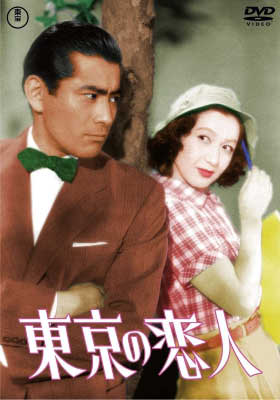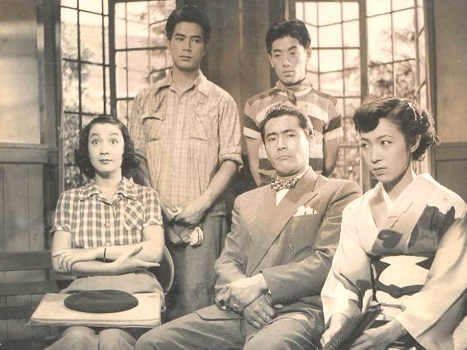I picked this to watch
last night totally at random. The title and the year suggested an old-fashioned
tale of post-war Japan. That sounded just right for the mood I was in. As
soon as the credits rolled by, I knew I had made a lucky choice. The two
leads are Toshirô Mifune and Setsuko Hara, probably the two greatest
Japanese actors in their history. They only worked together in two films.
I have of course seen Mifune in many of his Akira Kurosawa films, but I am
much less familiar with Setsuko. She is a revelation here. So natural, at
ease, charming, modern. She is famous for her roles in a few Ozu films (that
I have yet to get to) - Late Spring, Early Summer, Tokyo Story among the
six that she worked with Ozu on. The film was everything I was hoping for.
A warm low-key comedy of community with a strain of inevitable tragedy quietly
running through the whole film. In a sense that is where Japan was at the
time. Recovering from the war, optimistic about the future but the effects
of the war are all around them.
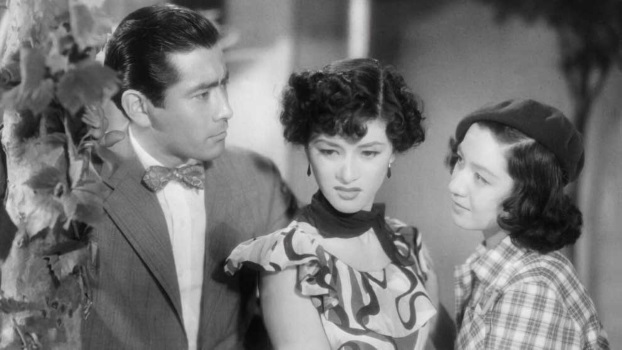
The film rarely mentions the war directly. One of the characters says during
fireworks, "it sounds like the bombs that killed father" and clearly most
of the characters are economically struggling. Yuki (Setsuko) draws portraits
on the sidewalks to make her living, Kurokawa (Mifune) makes copies of jewelry,
the three shoeshine boys are orphans, Harumi (Yôko Sugi) is a streetwalker,
Konatsu (Murasaki Fujima) is a mistress and most of the side characters are
making do. But they are all a community that helps one another when times
are tough. No one looks down on anyone else - not even the prostitute or
the mistress- you do what you have to do to survive. With the exception of
the Boss who looks down on everyone. There are some very funny moments in
the film and it ends on an up-beat but prepare yourself for a few tears as
well.
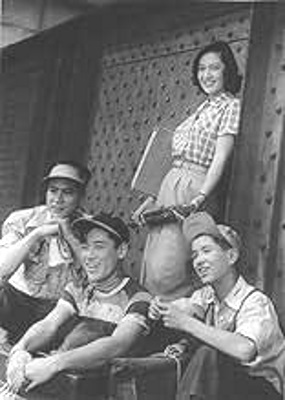
The three shoeshine boys who call themselves the Three Musketeers stop by
Yuki's apartment every morning to pick her up and go to work together. She
tosses them two baseballs out of her window first. She is the Tokyo Sweetheart.
They take the tram across the Sumida River where they do their business.
The boys set up shop on the sidewalk, Yuki standing off to the side in her
beret waiting for customers to draw. Kurokawa in his bow-tie and fedora arrives
to visit the jewelry store right there - run by an elderly husband and wife.
He has finished the replica of a diamond ring that they exhibit in the window
for 50,000 yen. They tell him it is perfect and that they can't tell which
is which. That turns out to be behind much of the comedy and confusion of
the film. Kurokawa sees Yuki and is immediately smitten.
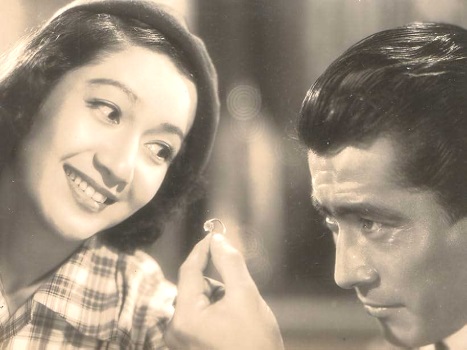
The mistress Konatsu pulls her benefactor into the shop and whines for the
ring. He says later. Akazawa (Hisaya Morishige) owns a business that makes
Pachinko balls and they are doing well. He is also married to a battleaxe
who keeps a close eye on him and is growing suspicious of why he is staying
out all night - for "special services" as Konatsu calls it. All these characters
mingle together - Kurokawa saves the three boys from some low-level punks,
sees Harumi sick on the street and takes her to her apartment house - which
is the same as Yuki's and later they have to persuade Kurokawa to pretend
to be Harumi's husband when her mother visits. And of course there is a mix-up
of the rings. If you have seen the wonderful Japanese film, Always, On Sunset
and Third from 2005, this is the sort of film that inspired it. Directed
by Yasuki Chiba.
